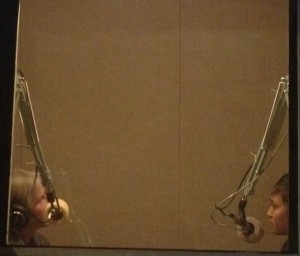 When I stepped back from full-time writing a few years ago, I knew that I would be giving up something I loved for something I felt was crucially important. But I had no idea what I would gain by making teaching, at Stanford University, a big part of my work life. In fact, I’m still discovering that now.
When I stepped back from full-time writing a few years ago, I knew that I would be giving up something I loved for something I felt was crucially important. But I had no idea what I would gain by making teaching, at Stanford University, a big part of my work life. In fact, I’m still discovering that now.
I’ll mumble on about writing and teaching and the nature of joy in a moment, but the real reason for this post is to link here:
Go ahead, check it out. I won’t even mind if you don’t come back. You see, I’ve learned that when teaching really works out, I’m just as happy to have you spend time with my students’ work as with my own.
Some of the benefits of teaching are obvious, especially compared to the hermetic ways of the homebound freelance writer. Certainly, there’s no better tonic for the creeping cynicism of a life in journalism than the optimism of the young, for example. Most days, these benefits are enough to justify the outrageous necessity to leave one’s house — showered and presentable, no less — simply to earn a living.
But here’s the hard part: Teaching and writing, for me at least, are a zero-sum game. The more I help and exhort others to write, the less I do so myself. Teaching is hard work after all, and done right it competes fiercely for both the hours and the seclusion needed to write deeply. It’s funny, but despite very long, full days at work, I sometimes feel almost retired. It’s a little, I imagine, like the athlete who becomes a successful coach after a career-ending injury robs him of his final years of competition. The wins are still satisfying, and the losses painful, but there’s a certain remove from the field of battle.
But there’s another new feeling that come with teaching, especially when students create something good enough, funny enough, audacious enough, or important enough to make me not just proud of them, but a little jealous, too.
This week, I feel like I’ve reached the next level: http://bit.ly/GenAnthro. Really, go ahead and give the top audio file a listen, at least the first minute or two. “Generation Anthropocene,” released yesterday, is a podcast series, and an exploration of the idea that humans have impacted the planet so much that we’ve essentially caused a new geologic age, the Anthropocene. The best part: Generation Anthropocene was conceived by one of my students, and executed by more than a dozen more.
Each student chose a subject to interview about this new age, and what it means for those who will live in it. What strikes me most about the interviews is that, taken together, they form a sort of inter-generational dialogue — or maybe even an interrogation. The age differences between interrogator and interrogated, and the disparities in both experience and status all but disappear, and it’s easy to forget that these are students who, with just two or three exceptions, had never conducted an interview before. I’m laughably biased, yes, but I challenge you to take a listen to the 45-minute long compilation — that top file again — and disagree with me.
I’m not quite sure what to call the feeling I get when I listen to these interviews. But I do know that it’s part of what will get me out of bed again in the morning tomorrow, and part of what makes me miss my writerly seclusion just a little bit less.
__
Photograph Miles Traer: Student and professor deep in conversation, KZSU studios
Now officially jealous. Ok, just so intensely admiring it feels like jealousy.
I love the way you write! I am also jealous of you, students and all, who KNOW how to connect with an idea and make it fly off the page towards me.
Thank you
Tom —
Very nice. Profound thoughts, personally written. Your post reminded me of a doctor with whom I wrote a couple of manuscripts many years ago. (Historical clue: he was the first person I knew who had an IBM XT.) He specialized in bariatric surgery, and had collected extensive follow-up data on his patients. He wanted to communicate his experience to other doctors. One day he told me his philosophy: “In the first part of my life I learned, in the next part I practiced. Now I want to share what I learned.” He was essentially teaching, but through the printed word rather than orally. He continued doing surgery, just as you continue to write. One big difference — he was able to hire a professional writer, so he had much less time pressure from doing two things. Whereas you have to teach in person. On the other hand, you get to see wonderful results from your teaching. It’s all part of entering what Erik Erikson called the Generative phase of life.